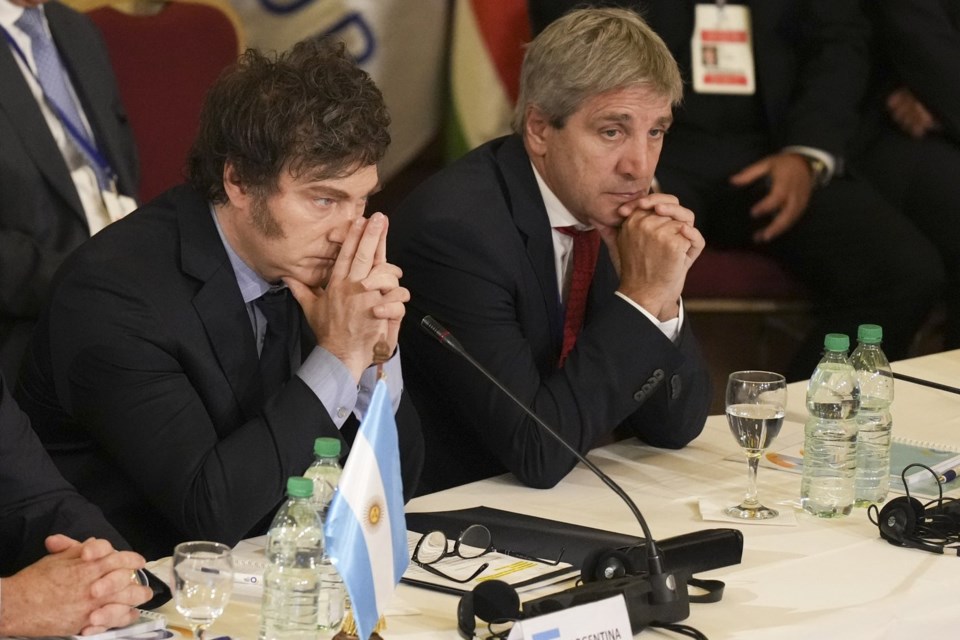BUENOS AIRES, Argentina (AP) — The libertarian government of President Javier Milei on Friday announced that it would lift most of the country’s strict capital and currency controls on Monday, a high-stakes gamble made possible by a new loan from the International Monetary Fund.
In a nationally televised address, Economy Minister Luis Caputo said the IMF’s executive board had decided to approve the $20 billion bailout package announced earlier this week, which offers a lifeline to Argentina’s dangerously depleting foreign currency reserves.
Caputo said the central bank would receive $12 billion from the IMF on Tuesday — a bigger-than-expected upfront sum that gives Argentina's foreign currency reserves breathing room to make the major change.
The new policy also involves cutting the Argentine peso free from its peg to the dollar and letting it trade within a so-called currency band that ranges from 1,000 to 1,400 pesos per dollar.
“The agreement will allow us, starting Monday, to lift the exchange rate controls that so severely limit the normal functioning of the economy,” Caputo said from the government headquarters in Buenos Aires. “Investments that are currently pending will begin to come into Argentina to take us to this new stage.”
The capital controls, known here as “el cepo,” or “the trap,” are a tangle of regulations that help to stabilize the peso at an official rate and prevent capital flight from Argentina.
Imposed by a previous administration in 2019, the restrictions curb individuals’ and companies’ access to dollars, discouraging the foreign investment that Milei needs to achieve his goal of transforming heavily regulated Argentina into a free economy. The restrictions have given rise to a vast black market where Argentines go to sell their depreciating pesos for dollars.
The announcement came as the IMF’s executive board was preparing to approve the new $20 billion loan agreement with Argentina, the 23rd rescue package in the nation's long and tumultuous history. After the first $12 billion disbursement from the IMF hits Argentina's central bank Tuesday, another $1 billion will arrive in June. International organizations will contribute another $6 billion as part of the deal.
Before Milei took office in December 2023, the previous left-wing Peronist administration ran up massive budget deficits, leading to sky-high inflation and a chronically weakening peso. By scrapping subsidies and price controls and ending reckless money-printing, Milei has delivered Argentina's first fiscal surplus in years and largely stabilized its macroeconomic picture, thrilling markets.
His government imposed an incentive scheme to lure capital into Argentina, but most investors have opted to wait for more signs that his radical free-market experiment was feasible before deciding to pour money into a volatile country infamous for defaulting on its debts.
Lifting the capital restrictions is perhaps the most critical of those signs. But before doing that, Milei needed to shore up the central bank’s foreign reserves with fresh cash from the IMF and ensure that the closely watched gap had narrowed enough between the parallel black market rate and the official exchange rate.
Without enough cash in the central bank, scrapping the controls could unleash years of pent-up demand for U.S. dollars and spark a currency run as companies try to send their long-trapped profits home.
“It could be a tsunami of money out,” said Christopher Ecclestone, a strategist with investment bank Hallgarten & Company. “It’s a total guessing game as to what people will do.”
It's a high-risk mission, as capital flight could imperil Milei’s primary accomplishment over his past 15 months in office — lowering inflation — ahead of crucial midterm elections in October in which his libertarian party hopes to expand its small congressional minority.
“The announcement is more audacious than expected. The government is making a bit of a leap of faith by lifting the cepo,” said Marcelo J. García, director for the Americas at New York-based geopolitical risk consultancy Horizon Engage. "It is bolder than one could have imagined at the start of an electoral year."
Although Milei has sought to avoid a politically costly devaluation of the peso that could set off an inflationary bout, analysts said it looked likely in order to narrow the gap between the multiple exchange rates.
As uncertainty over the IMF deal spread jitters among investors in recent weeks, the peso jumped to more than 1,350 per dollar on the black market. The official rate remains currently around 1,000. García expected an initial devaluation of around 20-25% to let the peso float — or, rather, sink — against the U.S. dollar and move within the currency band of 1,000-1,400.
An official devaluation would undo Milei’s progress on inflation at a time when Argentines have become increasingly concerned that his progress on lowering prices might be stalling.
On Friday, Argentina’s National Statistics Institute, or INDEC, reported that monthly inflation had accelerated in March to its fastest pace in seven months, with consumer prices up 3.7% from the month before mainly as a result of rising food prices.
Isabel Debre, The Associated Press


